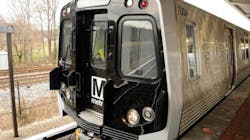WMATA ordered to remove 7000-series fleet following Blue Line derailment
Updated 10/18/21 at 4:15 p.m.
The Washington Metropolitan Area Transit Authority (WMATA) will operate all lines at 30-minute headways on Monday, Oct. 18, after it pulled all 7000-series cars from service following a Blue Line derailment last week.
“As part of the investigation into the Blue Line derailment, Metro is holding out of service all of its 7000-series railcars, which is nearly 60 percent of its rail fleet. Without these railcars, Metro will operate about 40 trains tomorrow – offering a basic service pattern on all lines of trains departing about every 30 minutes. All trains will operate as six-car trains,” the authority said via prepared statement.
In an update the afternoon of Oct. 18, WMATA said the reduced service is expected to continue until at least Sunday, October 24 with all 748 of its 7000-series cars offline. Service on the Red Line will operate every 15 minutes starting Oct. 19, other lines will operate every 30 minutes and the Silver Line will operate between Wiehle-Reston East and Federal Center SW only.
The derailment occurred near Arlington Cemetery Station on Oct. 12. The National Transportation Safety Board (NTSB) has two railroad accident investigators looking into the incident and will coordinate with WMATA and its safety oversight agency, the Washington Metrorail Safety Commission.
The Washington Metrorail Safety Commission ordered WMATA to pull the 7000-series cars by 5:00 a.m. Oct. 18 after NTSB initially determined the car involved in the derailment had a fourth axle that was out of compliance with specifications for the 7000-series car wheel and axle assembly. Additionally, similar defects were found in 7000-series cars not involved in the derailment.
Under the Washington Metrorail Safety Commission order, WMATA will also develop a plan to assess the cause, detection and prevention of the anomalies in the railcars, as well as implement a plan to return the cars to service once they are deemed safe.
The 7000-series cars were manufactured by Kawasaki with the first railcar entering service in 2014. At the time the cars were introduced, they were lauded as being designed with extensive customer input and for including state-of-the-art safety features including “anti-climbers” that help keep cars upright and in-line in the event of a collision.
Last March, WMATA awarded a contract to Hitachi Rail for the authority’s next generation of railcar, the 8000 series, which will replace WMATA’s 2000-series and 3000-series railcars.
About the Author

Mischa Wanek-Libman
Group Editorial Director
Mischa Wanek-Libman is director of communications with Transdev North America. She has more than 20 years of experience working in the transportation industry covering construction projects, engineering challenges, transit and rail operations and best practices.
Wanek-Libman has held top editorial positions at freight rail and public transportation business-to-business publications including as editor-in-chief and editorial director of Mass Transit from 2018-2024. She has been recognized for editorial excellence through her individual work, as well as for collaborative content.
She is an active member of the American Public Transportation Association's Marketing and Communications Committee and served 14 years as a Board Observer on the National Railroad Construction and Maintenance Association (NRC) Board of Directors.
She is a graduate of Drake University in Des Moines, Iowa, where she earned a Bachelor of Arts degree in Journalism and Mass Communication.
